Cancer Drug Shows Potential Against Pseudo SARS-CoV-2 in Lab Tests
The COVID-19 pandemic impacted health and life. The coronavirus SARS-CoV-2 represents the major infection source and various forms of vaccines have been rapidly developed and distributed world-wild in the past year. However, it remains a global health issue. Read the May 19, 2021 press release Cancer Drug Shows Potential Against Pseudo SARS-CoV-2 in Lab Tests from Vital Signs School of Medicine.
SARS-CoV-2 infection depends on viral Spike protein recognition of host cell surface receptor proteins including ACE2. Antibodies or traps disrupting SARS-CoV-2 binding to ACE2 have been proposed as potential approaches to antagonize SARS-CoV-2 infection. Upon binding SARS-CoV-2, ACE2 will be internalized and degraded through lysosomal pathways. How normal ACE2 protein turnover is regulated remains largely elusive.
The team identified a kinase casein kinase 1 alpha (CK1a) that plays an indispensable role in stabilizing ACE2 proteins in a panel of kidney cancer cell lines with high ACE2 expression. Echoing genetic CK1a depletion in reducing ACE2 protein levels in cells, treatment with an FDA approved small molecule lenalidomide in treating patients with anemia, mantle cell lymphoma, and another lymphoma by serving as a CK1a PROTAC, efficiently downregulates ACE2 expression in cell culture and subsequently attenuates SARS-CoV-2 spike protein condition pseudo-viral infection in cells. These data suggest a potential in repurposing lenalidomide in alleviating SARS-CoV-2 infection. Notably, if lenalidomide treatment efficiently blocks SARS-CoV-2 infection in animal models, and if lenalidomide affects normal ACE2 function in converting angiotensin warrants further in-depth investigations.
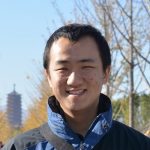
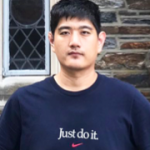
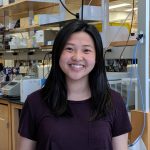

Two postdocs Drs. Siyuan Su and Jianfeng Chen and a BBSP graduate student Ying Wang in Pengda Liu Lab led this study during the pandemic. Lilly Wong from Guochun Jiang Lab plays a major role in in-vitro infection models. The collaboration between Liu and Jiang Labs at Biochemistry and Biophysics greatly facilitate this study.
Abstract
SARS-CoV-2, a novel coronavirus and the causative agent of COVID-19 has caused a global social and economic disruption. With no approved drugs and vaccines for COVID-19, there is an urgent need for an in-depth understanding of molecular details for SARS-CoV-2 biology. Here, we report that the human receptor ACE2 for SARS-CoV-2 infection is recognized and protected by the E3 ligase SPOP. SPOP binds a canonical ΦΠSSS degron sequence in the ACE2 signal peptide region to stabilize ACE2 proteins from destruction, a process triggered by CK1-mediated phosphorylation of the SPOP degron sequence in ACE2. Inhibiting CK1 kinase activity by pharmacological inhibitors, or administration of CK1a PROTAC lenalidomide reduces endogenous ACE2 protein levels in cells. More importantly, lenalidomide treatment attenuates infection of kidney-derived cells by SARS-CoV-2 S protein conditioned pseudoviruses in vitro, highlighting a promise in applying the FDA-approved drug lenalidomide in treating SARS-CoV-2 infection. We hope that our identification and tests for the efficacy of inactivating the SPOP/CKI signaling in reducing ACE2 protein expression to block SARS-CoV-2 infection provide a timely investigation into new therapeutic directions to combat COVID19.
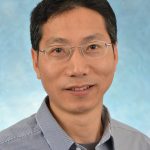
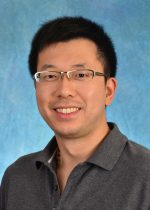
Guochun Jiang is an Assistant Professor of Biochemistry and Biophysics and joint with UNC HIV Cure Center.
Pengda Liu, PhD is an Assistant Professor of Biochemistry and Biophysics and member of Lineberger.
